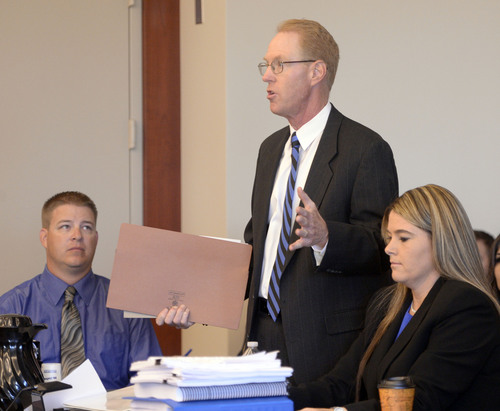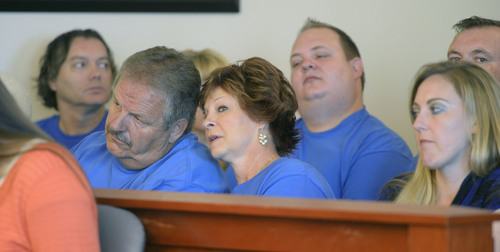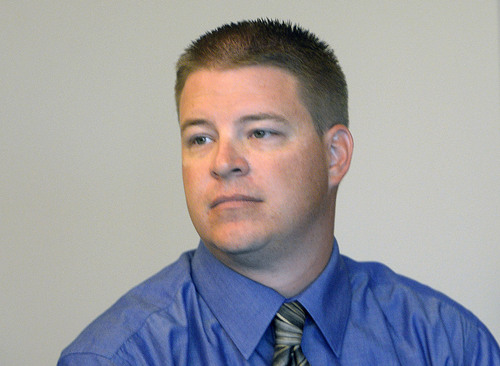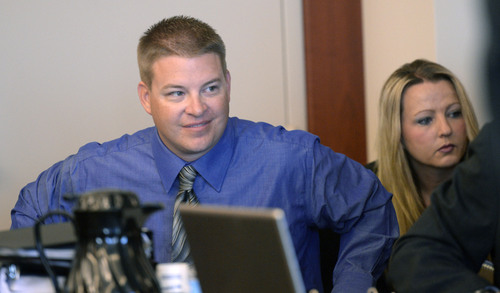This is an archived article that was published on sltrib.com in 2014, and information in the article may be outdated. It is provided only for personal research purposes and may not be reprinted.
The stakes are high in former West Valley City detective Shaun Cowley's case: he could sit in prison for up to 15 years if convicted as charged of manslaughter.
Because the penalty is so high, defense attorney Lindsay Jarvis said Tuesday that her client shouldn't be convicted based on someone's hunch, best guess or assumption – which is why she and co-counsel Paul Cassell vigorously attacked statements made by the prosecution's expert witnesses during the second day of Cowley's preliminary trial.
The 34-year-old former detective is charged in 3rd District Court with second-degree felony manslaughter in connection to the 2012 fatal shooting of Danielle Willard.
"Expert evidence can land people in prison that don't need to be in prison," she told news reporters Tuesday. "These are assumptions. These are estimates. These are best guesses. People shouldn't go to prison for 'best guesses.' "
Forensic scientist Michael Haag had testified Monday that he concluded that on the day of Nov. 2, 2012, Cowley was likely standing off to the side of Willard's vehicle when he shot and killed her, and not directly behind it like the former detective claimed in a later interview.
However, on Tuesday morning, Jarvis pointed out that while there were points of reference that allowed Haag to clearly define the trajectory of several of the bullets fired by Cowley and his partner, Detective Kevin Salmon, the first and fatal shot fired by Cowley was not as precisely measured. She called this Haag's "best guess" of the bullet trajectory.
Haag said his "best estimate" was all he had for that first bullet, because unlike the others, the bullet traveled through glass and hit Willard's head, leaving no fixed impact points on which he could base his conclusion.
Prosecutor Blake Nakamura said Haag's analysis of the entire situation is important, because it shows at what angle that shot could or could not have occurred.
"Everybody likes to isolate things," Nakamura said. "Because when you isolate things, you can put a different story to that isolated fact. What we try to do is bring a totality to all of this information. It's this totality that is most important."
According to testimony, Cowley claimed that he shot 21-year-old Willard out of fear for his and Salmon's life as Willard backed her car out of a parking stall following an alleged drug deal at a nearby residence. But prosecutors contend that Cowley was never in any danger of being hit by Willard's vehicle on that day.
Salt Lake City police Detective Chris Kotrodimos was also called to testify Tuesday as an expert witness in general police training. He said Cowley and Salmon did not use proper police procedures when they approached Willard's vehicle and drew their guns after she wouldn't open her car door and had put something, which they suspected to be drugs, in her mouth.
"They took a low-key traffic stop and escalated it unnecessarily," Kotrodimos said.
"[They] didn't use proper police tactics," Kotrodimos added. "They didn't adhere to proper police standards. Ultimately, Mr. Cowley used unnecessary force, deadly force against Ms. Willard."
During a lengthy cross-examination, Cassell focused on Kotrodimos' expert qualification and how he drew his conclusions. He suggested that Kotrodimos formed his opinions as he was hearing information from others that Cowley was a "bad cop" who didn't follow the rules. When Cassell asked him if this influenced his opinion in his report, Kotrodimos said "absolutely not."
Cassell also introduced a sworn statement from Unified Police Department Sgt. Jason Jones, who said that at a meeting with the Salt Lake County District Attorney's Office, he saw Kotrodimos give charging recommendations to a prosecutor.
"In my 22 years of law enforcement, I had never seen something like this," the statement read. "… I found it odd."
Jones said in his statement that he did not recommend that charges be filed against Cowley. He said District Attorney Sim Gill said at a June news conference that all of those involved in screening the charges had voted in favor of filing the manslaughter charge against Cowley.
"That is not true," he wrote. "I was not present for any such vote."
Jarvis said she and Cassell, a University of Utah law professor and a former federal court judge, plan to put on a full defense during this week's preliminary hearing by calling their own witnesses on Wednesday, the last day in the preliminary hearing.
"This is wrong. This is absolutely wrong," Jarvis said of the charge against Cowley. "This is not a case where an officer killed somebody in daylight in cold-blooded murder."
During the preliminary hearing, prosecutors present evidence and a judge must decide whether there is probable cause that a crime was committed and that Cowley likely committed the crime. Because it is a lower burden of proof than at trial — where prosecutors must prove a crime beyond a reasonable doubt — defense attorneys rarely call their own witnesses at the preliminary hearing stage.
"We want this thing thrown out now," Jarvis said, adding that she felt the charge was "bogus" and filed for political reasons.
The first witness expected to testify on Wednesday morning is Willard's alleged drug dealer, David Gines. The defense attorneys have said they also plan to call a "force science" expert who will testify about use-of-force by police officers.
Cowley was fired by West Valley City — but for allegedly mishandling evidence, not for allegedly shooting Willard.
Twitter: @jm_miller









